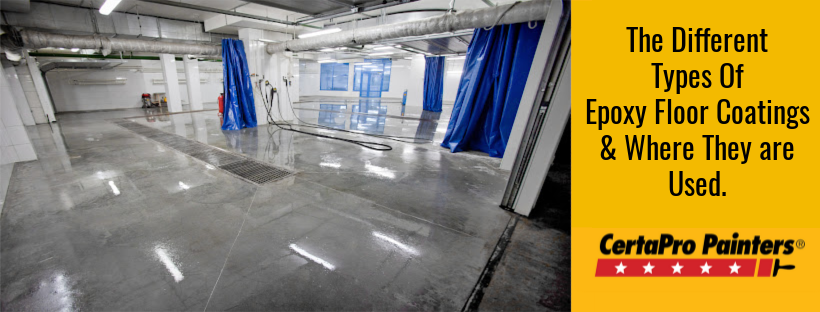
The Different Types Of Epoxy Floor Coatings & Where They are Used
Posted on July 29, 2022
When it comes to choosing new flooring systems for industrial use, garage floor coating, or any other outdoor surfaces, epoxy floor coatings truly stands out from other flooring options for many reasons.
Epoxy flooring, otherwise known as resinous flooring, is highly durable, customizable, sustainable, and decorative for any surface. What makes epoxy flooring great is its resistance to high levels of wear and tear. It is the most long-lasting flooring option. If you are considering epoxy resin flooring, here is an explanation of what epoxy floors are made up of, the different types of epoxy resin, and where to use specific types of epoxy flooring systems.
What is Epoxy?
Epoxy coatings are often used to protect wood floors from scratches and stains. They can also be applied directly onto concrete or tile surfaces. Epoxies are typically made up of three components: an epoxy resin, a hardener, and a catalyst. These components must be mixed together before application. Once mixed, they cure into a solid, flexible substance that adheres strongly to the surface it is applied to. Epoxies can be cured either thermally (by heating) or chemically (by exposure to ultraviolet light).
What is Epoxy Flooring?
The most straightforward definition for epoxy flooring suggests that a flooring surface composed of multiple layers of epoxy is applied to a floor that is at least two millimeters deep. Epoxy flooring can also refer to a flooring surface that is coated with epoxy, however, confusion often arises when comparing epoxy flooring and epoxy floor coatings. The difference between the latter and the former lies in the thickness of the epoxy – epoxy floors are classified into epoxy coatings of at least two millimeters thick. Any epoxy floors thinner than two millimeters are commonly referred to as epoxy floor coatings rather than epoxy floors.
Types of Epoxy Flooring & Where To Apply Them:
Self-Leveling Epoxy Floors:
self-leveling epoxy is utilized to apply over new, old, cracked, or damaged concrete floors to create a smooth, durable, and a leveled texture on the surface of the floor. Self-leveling epoxy floors not only provide a shiny, seamless look but it comes in many different colors that appeal to commercial, industrial, and residential spaces.
Where To Use Self-Leveling Epoxy Floors:
- manufacturing buildings,
warehouses,
showrooms,
commercial garages,
kitchens,
athletic facilities,
and more.
Epoxy Mortar Floors:
This flooring option classifies as the most stringent epoxy floor system available for use. This epoxy floor is made up of 100% solid epoxies and graded or quartz sand. Mortar systems are ideal for spaces that require a floor that is highly chemically-resistant and can withstand a great deal of impact. This epoxy floor can be used to repair cracks before applying another type of epoxy floor.
Where To Use Epoxy Mortar Floors:
- mechanical spaces
Warehouses
commercial kitchens
restaurants, garages
manufacturing plants.
Quartz-Filled Epoxy Floors:
Quartz epoxy flooring is a combination of a high-performance epoxy polymer resin and stained quartz grains. This epoxy should be utilized for decorative spaces that require sanitary and slip-resistant properties.
Where to Use Quartz-Filled Epoxy Floors:
- locker rooms
restrooms
schools
cafeterias
lobbies
offices
showrooms
and more.
Anti-Static Epoxy Floors (Electro-static charge (ESD) Resistant Floors):
ESD can be hazardous to many work environments. To reduce any static hazards in your spaces, anti-static epoxy floors can be applied. This epoxy floor typically holds a conductive compound that accumulates static electricity that dissipates any potential discharge. An anti-static solution is a highly recommended epoxy floor for spaces that contain flammable materials.
Where to Use Anti-Static Epoxy Floors:
- electronic, chemical, or pharmaceutical manufacturing facilities,
healthcare facilities,
or any spaces that use flammable gasses or liquids that bring a risk of combustible dust buildup.
Epoxy Flake Floors:
This type of epoxy floor contains colored flake materials that are inserted in the epoxy to create a vibrant, multi-hued look. The flakes not only offer a seamless look but also provide each surface with subtle grooves to reduce any slips and falls. Epoxy flake floors come in an infinite variety of sizes, colors, styles, and textures that is customizable for any space.
Where To Use Epoxy Flake Floors:
- locker rooms,
sports venues,
showrooms,
clinics,
commercial kitchens,
and more.
Epoxy flooring is a versatile chemical solution that is practical, long-lasting, highly resistant to impact, and customizable for any space. Whether you need an elegant entrance to a restaurant or need an unyielding surface to withstand industrial work – there is an epoxy floor system right for your space.
Do you have an epoxy flooring project you would like to begin? Call CertaPro Painters of SWFL at 239-390-4100 or go online to schedule an appointment today!





